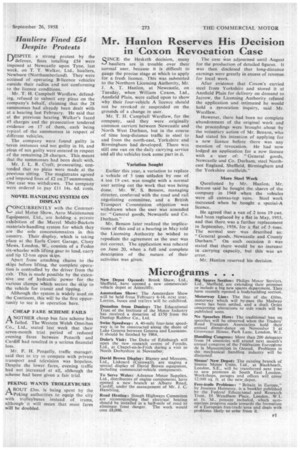Mr. Hanlon Reserves His Decision in Coxon Revocation Case
Page 115

If you've noticed an error in this article please click here to report it so we can fix it.
QINCE the Hesketh decision, many Li hauliers are in trouble over their normal user, because it is difficult to gauge the precise stage at which to apply for a fresh licence. This was submitted to the Northern Licensing Authority, Mr. J. A. T. Hanlon, at Newcastle, on Tuesday, when William Coxon, Ltd., Annfield Plain, were called upon to show why their four-vehicle A licence should not be revoked or suspended on the grounds of a change in user.
Mr. T. H. Campbell Wardlaw, for the company, said they were originally common carriers between Newcastle and North West Durham, but in the course of time long-distance traffic in steel to and from the north-east, Yorkshire and Birmingham had developed. There was still one van on the daily carrying service and all the vehicles took some part in it.
Variation Sought
Earlier this year, a variation to replace a vehicle of 3 tons unladen by one of 4 ton 19 cwt. was sought with a normal user setting out the work that was being done. Mr. W. S. Benson, managing director, conferred with the road and rail negotiating committee, and a British Transport Commission objection was withdrawn when the user was amended to: " General goods, Newcastle and Co. Durham."
Mr. Benson later realized the implications of this and at a hearing in May told the Licensing Authority he wished to repudiate the agreement as the user was not correct. The application was reheard on June 20, when a full and complete description of the nature of their activities was given. The case was adjourned until August for the production of detailed figures. It was then disclosed that long-distance earnings were greatly in excess of revenue for local work.
After evidence that Coxon's carried steel from Yorkshire and stored it at Annfield Plain for delivery on demand to Jarrow, the Licensing Authority refused the application and intimated he would hold a revocation inquiry, said Mr. Wardlaw.
However, there had been no complete abandonment of the original work and the proceedings were brought about by the voluntary action of Mr. Benson, who had stated his intention of applying for a new licence before there was any mention of revocation. He had now lodged an application for a new licence with a user of: "General goods, Newcastle and Co. Durham, steel Northeast England, Sheffield, Birmingham and the Yorkshire coalfields."
More Steel Work Questioned by Mr. Hanlon, Mr. Benson said he bought the shares of the company in 1948 when the vehicles were all canvas-top vans. Steel work increased when he bought a special-A licence.
He agreed that a van of 2 tons 19 cwt. had been replaced by a flat in May, 1955, and that there was a further replacement in September, 1956, for a flat of 5 tons. The normal user was described as: "General goods, Newcastle and County Durham." On each occasion it was stated that there would be no increase in carrying capacity, but this was an error.
Mr. Hanlon reserved his decision.












































































































































































































































































































































